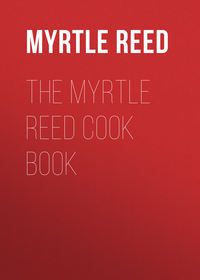 полная версия
полная версияMaster of the Vineyard
Grandmother surveyed Matilda with a penetrating, icy stare. "You've got freckles on your mind," she said. "Rosemary, will you go to the post-office and not keep me waiting?"
The girl glanced at her brown gingham dress, and hesitated.
"You're clean enough," Grandmother observed, tartly. "Anybody'd think you had a beau waitin' for you somewheres."
Young People's CallsShe flushed to her temples, but did not speak. Her face was still red when she went out, wearing a brown straw hat three Summers old.
"The paper says," Grandmother continued, "that a blush is becomin' to some women, but Rosemary ain't one that looks well with a red face. Do you suppose she has got a beau?"
"Can't prove it by me," Matilda sighed, looking pensively out of the window. "That Marsh boy come to see her once, though."
"He didn't come again, I notice, no more'n the minister did."
"No," Matilda rejoined, pointedly, with a searching glance at Grandmother, "and I reckon it was for the same reason. When young folks comes to see young folks, they don't want old folks settin' in the room with 'em all the time, talkin' about things they ain't interested in."
"Young folks!" snorted Grandmother. "You was thirty!"
"That ought to be old enough to set alone with a man for a spell, especially if he's a minister."
"I suppose you think," the old lady returned, swiftly gathering her ammunition for a final shot, "that the minister was minded to marry you. I've told you more 'n once that you're better off the way you are. Marriage ain't much. I've been through it and I know."
Face to FaceWith that, she sailed triumphantly out of the room, closing the door with a bang which had in it the sound of finality. Poor Miss Matilda gazed dreamily out of the window, treasuring the faint, fragrant memory of her lost romance. "If Rosemary has got a beau," she said to herself, "I hope she won't let Ma scare him away from her."
At the post-office, Rosemary met Alden, face to face. She blushed and stammered when he spoke to her, answered his kindly questions in monosyllables, and, snatching The Household Guardian from the outstretched hand of the postmaster, hurried away.
Presently he overtook her. "Please, Rosemary," he said, "give me just a minute. I want to talk to you. I haven't seen you for a long time."
"Yes?" She stopped, but could not raise her eyes to his face.
"I can't talk to you here. Come on up the hill."
"When?" The girl's lips scarcely moved as she asked the question.
"Now. Please come."
"I'll – I'll have to go home first, with this," she replied, indicating the paper. "Then I'll come."
"All right. I'll go on ahead and wait for you. Shall I tie the red ribbon to the tree?" He spoke thoughtlessly, meaning only to be pleasant, but the girl's eyes filled. She shook her head decisively and neither of them spoke until they reached the corner where she must turn.
Waiting for Rosemary"Good-bye," she said.
"Auf wiedersehen," he replied, lifting his hat. "Don't be long."
Always, before, it had been Rosemary who waited for him. Now he sat upon the log, leaning back against the tree, listening to the chatter of the squirrels and the twitter of little birds in the boughs above him. It was not yet noon, and the sunlight made little dancing gleams of silver-gilt on the ground between the faint shadows of the leaves. He waited for her in a fever of impatience, for in his pocket he had a letter for Edith, addressed in a dashing masculine hand.
Not so long ago, in this same place, he had asked Rosemary to marry him. Now he must ask her to release him, to set him free from the bondage he had persisted in making for himself. He made a wry face at the thought, unspeakably dreading the coming interview and, in his heart, despising himself.
Rosemary did not keep him waiting long. When she came, she was flushed and breathless from the long climb – and something more. She sank down upon the seat he indicated – her old place.
The Hour of Reckoning"It's been a long time since we were here last," Alden observed, awkwardly.
"Has it?" The grey eyes glanced at him keenly for a moment, then swiftly turned away.
"I've – I've wanted to see you," Alden lied.
"I've wanted to see you," she flashed back, telling the literal truth.
Alden sighed, for there was tremulous passion in her tone – almost resentment. He had treated her badly, considering that she was his promised wife. She had been shamefully neglected, and she knew it, and the hour of reckoning had come.
For the moment he caught at the straw the situation seemed to offer him. If they should quarrel – if he could make her say harsh things, it might be easier. Instantly his better self revolted. "Coward!" he thought. "Cad!"
"I've wanted to see you," Rosemary was saying, with forced calmness, "to tell you something. I can't marry you, ever!"
"Why, Rosemary!" he returned, surprised beyond measure. "What do you mean?"
The girl rose and faced him. He rose, too, awkwardly stretching out his hand for hers. She swerved aside, and clasped her hands behind her back.
It's All a Mistake"I mean what I said; it's plain enough, isn't it?"
"Yes," he answered, putting his hands in his pockets, "it's perfectly plain. If I've done anything to hurt or offend you in any way, I – I'm sorry." So much was true. He was sorry for Rosemary and had never been more so than at that very moment. "You'll give me a reason, won't you?" he continued.
"Reason?" she repeated, with a bitter laugh. "Oh, I have plenty of reasons!" His heart sank for a moment, then went on, evenly. "It's all a mistake – it's never been anything but a mistake. I couldn't leave Grandmother and Aunt Matilda, you know. They need me, and I shouldn't have allowed myself to forget it."
"Yes," Alden agreed, quickly, "I suppose they do need you. I was selfish, perhaps."
Hot words came to her lips but she choked them back. For an instant she was tempted to tell him all she had seen and heard a few days before, to accuse him of disloyalty, and then prove it. Her face betrayed her agitation, but Alden was looking out across the valley, and did not see. In his pocket the letter for Edith lay consciously, as though it were alive.
"It isn't that you don't love me, is it?" he asked, curiously. His masculine vanity had been subtly aroused.
They PartRosemary looked him straight in the face. She was white, now, to the lips. "Yes," she lied. "It is that more than anything else."
"Why, my dear girl! I thought – "
"So did I. We were both mistaken, that is all."
"And you really don't love me?"
"Not in the least."
Alden laughed – a little mirthless, mocking laugh. It is astonishing, sometimes, how deeply a man may be hurt through his vanity. Rosemary had turned away, and he called her back.
"Won't you kiss me good-bye?" he asked, with a new humility.
Then Rosemary laughed, too, but her laugh was also mirthless. "No," she answered, in a tone from which there was no appeal. "Why should I?" Before he realised it, she was gone.
He went back to the log and sat down to think. This last tryst with Rosemary had been a surprise in more ways than one. He had been afraid that she would be angry, or hurt, and she had been neither. He had come to ask for freedom and she had given it to him without asking, because she could not leave Grandmother and Aunt Matilda, and because she did not love him. He could understand the first reason, but the latter seemed very strange. Yet Rosemary had looked him straight in the face and he had never known her to lie. He had a new emotion toward her; not exactly respect, but something more than that.
A Letter for EdithThen, with a laugh, he straightened his shoulders. He had what he wanted, though it had not come in the way he thought it would. If he had been obliged to ask her to release him, he would have felt worse than he did now. The letter in his pocket, heavy with portent, asserted itself imperiously. He hurried home, feeling very chivalrous.
Edith, cool and fresh in white linen, with one of the last of the red roses thrust into her belt, was rocking on the veranda, with a book in her lap which she had made no pretence of reading. Two or three empty chairs were near her, but Madame was nowhere to be seen. Alden handed her the letter. "I'm free!" he said, exultantly.
Edith smiled, then, with shaking hands, tore open the letter. Alden eagerly watched her as she turned the closely written pages, but her face was inscrutable. She read every word carefully, until she reached the signature. Then she looked up.
"I'm not," she said, briefly. She tossed the letter to him, and went into the house. He heard her light feet upon the stairs and the rustle of her skirts as she ascended. Perfume persisted in the place she had just left – the rose at her belt, the mysterious blending of many sweet odours, and, above all, the fragrance of Edith herself.
Alden Reads the Letter"It's nonsense," he murmured, looking after her. All her quixotic notions of honour would eventually yield to argument – of course they would. Yet his heart strangely misgave him as he read the letter.
"My dear Edith," it began.
"Your letter has somewhat surprised me, and yet I cannot say I feel that I don't deserve it. Since you have been away I have been doing a good deal of thinking. Of course you and I haven't hit it off very well together, and, as I can see no point where you have failed me, I realise that it must be my fault and that I have failed you.
"I wish you had talked to me about it, instead of going away, and yet, even as I write the words, I see how impossible it would have been, for we haven't been in the habit of talking things over since the first year we were married. Gradually the wall of silence and reserve has grown up between us, but while you, with the quicker insight of a woman, have seen it growing, I haven't realised it until it was completed.
"Your offering me my freedom has made me wonder what my life would be without you. No one has ever filled your place to me, or ever will. I may have seemed careless, thoughtless – indeed, I have been both, and constantly, but always in the background has been the knowledge that you were there – that I could depend upon you.
The Husband's Point of View"It may seem like a trite and commonplace thing to say, but upon my word and honour, Edith, I haven't meant to fail you, as I see I have in a thousand ways. I'm sorry, deeply sorry, but I know that the words will not mean much to you.
"Since I first saw you, there's never been any woman in the world for me but you, and there never will be, even though you should cast me off as I deserve. If you can make up your mind to come back to me and let me try again, I'll do my best to make you happy – to consider you instead of myself.
"Men are selfish brutes at the best, and I don't claim to be any better than the average, but all I'm asking for now is a chance to make myself worthy of you – to be the sort of husband a woman like you should have.
"Please let me hear from you very soon.
"Your loving husband,"W. G. L."Alden read it again, though he did not need to – he had understood every word of it the first time. Then he folded it, slowly and precisely, and put it into the torn envelope. He tapped on the arm of the chair for a moment with the edge of the envelope, then, mechanically, put it into his pocket.
Effect upon AldenA robin, in a maple tree beyond him, piped his few notes with unbearable intensity. Discordant chirps assailed his ears from the lattice where the climbing rose put forth its few last blooms. Swaying giddily in a crazy pattern upon the white floor of the veranda, was the shadow of the rose, the plaything of every passing wind. He remembered the moonlight night which might have been either yesterday or in some previous life, as far as his confused perceptions went, when Edith had stood with the rose in her hand, and the clear, sharply-defined shadow of it had been silhouetted at her feet.
All his senses seemed mercilessly acute. Some of the roses were almost dead and the sickening scent of them mingled with the fragrance of those that had just bloomed. It made him dizzy – almost faint.
The maid announced luncheon, but food, or the sight of his mother were among the last things he desired, just then. Affecting not to hear, he went out, got a boat, and rowed far up the river alone.
When he was utterly exhausted, he shipped the oars and let himself drift back, pushing out from shore now and then when the current brought him too near. He knew, with crushing certainty, that Edith would not be swerved from her chosen path by argument – but he could at least try.
A Silent FunctionWhite-faced and weary, he went to his room when he reached home, lay down, and tried to sleep, but sleep would not come. He seemed to have come to a point of absolute bodily suspension, neither to hunger nor thirst nor sleep again. It was, in a way, like a clock, that ticks steadily, though the hands are definitely fixed at a certain hour and will not move.
He forced himself to dress for dinner and to go down at the proper time. Madame was waiting, but Edith was late. When she appeared, she was in the white linen gown she had worn all day, with the withered rose in her belt. It was the first evening she had not dressed for dinner and she at once apologised to Madame.
"I'm sorry," she said, "but it seemed impossible to make the effort to-night. You'll forgive me, won't you?"
"Of course," Madame returned sweetly.
"Of course," Alden echoed. His voice sounded distant and his eyes were dull.
As dinner bade fair to be a silent function, Madame turned to Edith with the first question that came into her mind.
"What have you been doing all the afternoon?"
"Packing," replied Edith, with dry lips.
Nothing to Say"Or rather, getting ready to pack." She did not look at Alden, but at Madame, with a wan little smile that made the old lady's heart suddenly very tender toward her.
"My dear! We'll miss you so."
"I know," Edith murmured, "and I shall miss you – more than words may say, but I have to go." She drained the glass of water at her plate, then added: "My husband wants me to come back. He has written to say so."
"Then," said Madame, "I suppose you will have to go."
"I suppose so," repeated Edith, parrot-like.
Alden's eyes never swerved from Edith's white face. In their depths was the world-old longing, the world-old appeal, but never for the fraction of an instant did Edith trust herself to look at him.
When they rose from the table, Edith went back to her room immediately, murmuring an excuse. Alden watched her despairingly until the hem of her white gown was lost at the turn of the stairs. Then he sat down with the paper, but he could not read, for the words zig-zagged crazily along the page.
Madame understood and sincerely pitied them both, but there seemed to be nothing to say. She leaned back in her chair, with her eyes closed, pretending to be asleep, but, in reality, watching Alden as he stared vacantly at the paper he held in his shaking hands.
Poor ComfortAt last he rose and went out upon the veranda. Madame started from her chair, then forced herself to lean back again, calmly. She heard the scraping of his chair as he moved it along the veranda, out of the way of the light that came through the open window. For a long time there was silence.
Longing to comfort him and unable to endure it longer, Madame went out, softly. He did not hear her step, for his head was bowed upon his hands. From a room above Edith's light streamed out afar into the sweet darkness, drawing toward it all the winged wayfarers of the night.
Madame slipped her arm around his shoulders, and bent down to him. "Dear," she said brokenly, "she's married."
Alden drew a quick, shuddering breath, and freed himself roughly from the tender clasp. "I know it, Mother," he cried, in a voice vibrant with pain. "For God's sake, don't remind me of that!"
XVIII
Starbreak
Edith's FailureThrough the long night Edith lay awake, thinking. Her senses were blindly merged into one comprehensive hurt. She was as one who fares forth in darkness, knowing well the way upon which he must go, yet longing vainly for light.
Her path lay before her, mercilessly clear and distinct. A trick of memory took her back to what Madame had said, the day after she came: "The old way would have been to have waited, done the best one could, and trusted God to make it right in His good time." She remembered, too, her bitter answer: "I've waited and I've done the best I could, and I've trusted, but I've failed."
Keenly she perceived the subtlety of her punishment. Attempting to bind the Everlasting with her own personal limitations, her own desires, she had failed to see that at least half of a rightful prayer must deal with herself. She had asked only that her husband might love her; not that she might continue to love him.
Out of HarmonyNow, with her heart and soul wholly in the keeping of another man, the boon had been granted her, in bitterness and ashes and desolation. He had said, in his letter, that her coming away had made him think. Through her absence he had seen the true state of affairs between them, as she could never have made him see it if she had remained at home. This, then, was God's way of revelation to him, but – to her?
The truth broke upon her with the vividness of a lightning flash. It was the way of revelation to her also, but how? She sat up in bed, propping herself back against the pillows, her mind groping eagerly for the clue.
During the past six years she had endeavoured constantly for a certain adjustment. Now it had come, but she herself was out of harmony. Were her feet to be forever set upon the ways of pain? Was there nothing at all in the world for her?
Alden, too, was awake and thinking. She felt it, through the darkness, as definitely as though he had been in the same room, with his face full in the light. He also was conscious of the utter hopelessness of it and was striving to see his way clearly.
Until then, she had not known how far his argument had swayed her, nor how much she had depended upon the thought that her husband would gladly accept the release she offered him. Her principles had not changed, but his possible point of view had not been considered before.
Irrevocably Bound"'Until death do us part,'" said Edith, to herself. "Not 'until death or divorce do us part'; nor yet 'until I see someone else I like better'; not even 'until you see someone else you like better,' And, again, 'forsaking all others keep thee only unto me so long as we both shall live.'"
Suppose he had violated his oath, consented to accept freedom at her hands, and gone his way? Would not the solemn words she had spoken at the altar still be binding upon her? She saw, now, that they would be, and that whatever compromise he might have been able to make with his own conscience, to be legally justified later, she was irrevocably bound, until death should divide them one from the other.
She smiled sadly, for it was, indeed, a confused and muddled world. Things moved crazily, depending wholly upon blind chance. One works steadily, even for years, bending all his energies to one single point, and what is the result? Nothing! Another turns the knob of a door, walks into a strange room, or, perhaps, writes a letter, and from that moment his whole life is changed, for destiny lurks in hinges and abides upon the written page.
For days, for months even, no single action may be significant, and again, upon another day, a thoughtless word, or even a look, may be as a pebble cast into deep waters, to reach, by means of ever-widening circles, some distant, unseen shore.
The One AffectedAll this had come from a single sentence. Louise Archer, upon her death-bed, had harked back to her school days, and, thinking fondly of Virginia Marsh, had bade her daughter go to her if she felt the need of a mother's counsel when her own mother was past the power of giving it. Years afterward, during a day of despondency, Edith had remembered. The pebble had fallen deep and far and had become still again, but its final circle had that day touched the ultimate boundary made by three lives.
It had, of course, made no difference to Madame, but two men and a woman had been profoundly shaken by it, though not moved from their original position. They would all stay where they were, of course – Alden with his mother, and Edith with her husband. Then, with a shock, Edith remembered Rosemary – she was the one who had been swept aside as though by a tidal wave.
Poor Rosemary! Edith's heart throbbed with understanding pity for the girl who had lost all. She had not asked how it had happened, merely accepting Alden's exultant announcement. Now she hoped that it might have been done delicately, so that Alden need not feel himself a brute, nor Rosemary's pride be hurt.
A Sleepless NightThen, through the night, came a definite perception, as though Alden himself had given her assurance. Rosemary had done it herself, had she? Very well – that was as it should be. For a moment she dwelt upon the fact with satisfaction, then, a little frightened, began to speculate upon this mysterious tie between herself and Alden.
The thing was absurd, impossible. She curled her short upper lip scornfully in the darkness. "You know it is," she said, imperiously, in her thought, as though in answer to a mocking question from somewhere: "Is it?"
She turned restlessly. All at once her position became tiresome, unbearable. She wanted to go to sleep, indeed she must sleep, for she had a long hard day before her to-morrow, putting her things into her trunks. Perhaps, if she rose and walked around her room a little —
One small, pink foot was on the floor, and the other almost beside it, when a caution came to her from some external source: "Don't. You'll take cold." She got back into bed, shivering a little. Yes, the polished floor was cold.
Then she became furious with Alden and with herself. Why couldn't the man go to sleep? It must be past midnight, now, and she would walk, if she wanted to. Defiantly and in a triumph of self-assertion, she went to the open window and peered out into the stillness, illumined by neither moon nor stars. The night had the suffocating quality of hangings of black velvet.
Sitting in the DarkShe lighted a candle, found her kimono and slippers, wrapped herself in a heavy blanket, and drew up a low rocker to the open window. Then she put out the light and settled herself to wait until she was sleepy.
The darkness that clung around her so closely seemed alive, almost thrilling, as it did, with fibres of communication perceptible only to a sixth sense. She marvelled at the strangeness of it, but was no longer afraid. Her fear had vanished at the bidding of someone else.
Why was it? she asked herself, for the hundredth time, and almost immediately the answer came: "Why not?"
Why not, indeed? If a wireless telegraph instrument, sending its call into space, may be answered with lightning-like swiftness by another a thousand miles away, why should not a thought, without the clumsy medium of speech, instantly respond to another thought from a mind in harmony with it?
A subtle analogy appeared between the earth and the body, the tower from which the wireless signalled and the thought which called to another. When the physical forces were at their lowest ebb, and the powers of the spirit had risen to keep the balance true, why was not communication possible always between soul and soul? And, if one lived always above the fog of sense, as far as the earth-bound may, what would be the need of speech or touch between those who belonged to one another?
Two ViewsShe and Alden "belonged," there was no doubt of that. She had, for him, the woman's recognition of her mate, which is never to be mistaken or denied when once it has asserted itself. "Why," she thought, "will people marry without it?" The other mind responded instantly: "Because they don't know."
Marriage presented itself before her in two phases, the one sordid and unworthy, as it so often is, the other as it might be – the earthly seal upon a heavenly bond. But, if the heavenly relationship existed, was the other essential? Her heart answered "No."
Slowly she began to see her way through the maze of things. "Dust to dust, earth to earth, ashes to ashes." Then she laughed outright, for that was part of the burial service, and she had been thinking of something else. And yet – earth to earth meant only things that belonged together; why not soul to soul?







